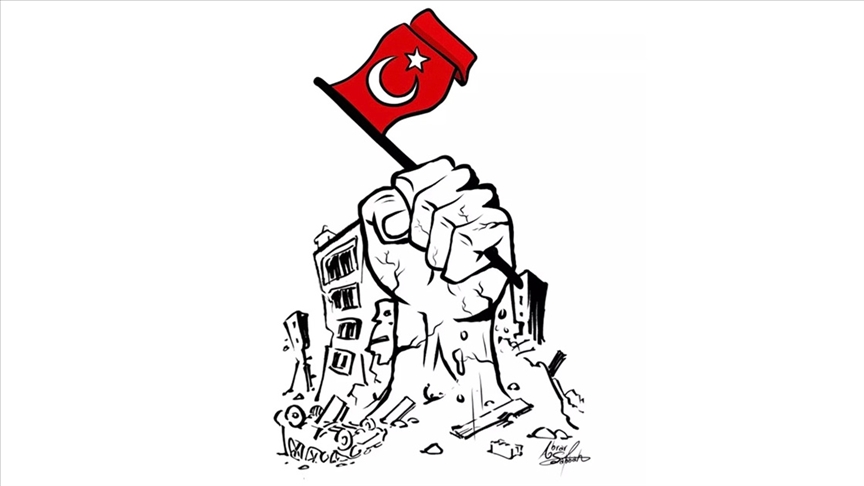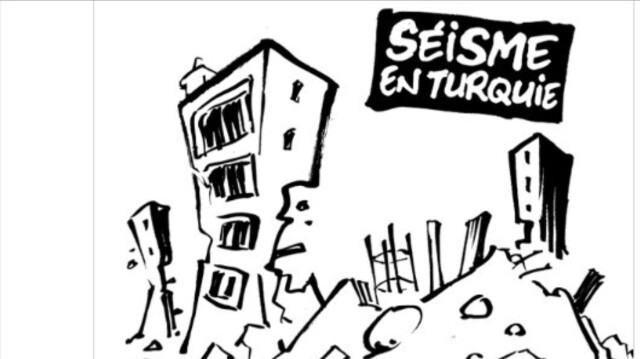The Treaty of Hudaibiyah had eliminated the blood feud between Banu Bakr ibn Abdumanat and Banu Khuza'a that had existed since the Age of Ignorance. Banu Bakr had allied with the Quraishis and Banu Khuza'a had entered into an alliance with Prophet Muhammad (pbuh) . However, Banu Bakr performed a night raid on Banu Khuza'a with the support of the Quraishis and killed the tribal leader Ka'b ibn Amr and several members of the tribe. The people of Buna Kuza'a sent a delegation to Medina to ask for help from Prophet Muhammad (pbuh). Indeed, the people of Banu Khuza'a had been fond of Prophet Muhammad (pbuh) and the religion he conveyed from the beginning; they helped the Muslims, particularly in the gathering of intelligence; and all the members of the tribe accepted Islam before the Treaty of Hudaibiyah. Prophet Muhammad (pbuh) sent a letter to the Quraishis to confirm what had happened and also to allow the Quraishis to redress the wrong. Prophet Muhammad (pbuh) offered two alternatives to the Quraishis. They could either pay the blood money for the victims of Banu Khuza'a or terminate their alliance with the aggressors who belonged to the Banu Bakr; failing these would mean the violation of the treaty and revenge would be sought. The Quraishis accepted neither paying the blood money for the victims of Banu Khuza'a nor terminating their alliance with Banu Bakr; they sent Abu Sufyan to Medina to renew the Treaty of Hudaibiyah. However, Abu Sufyan returned to Mecca without obtaining a positive result from his efforts in Medina.
Prophet Muhammad (pbuh) decided to organize a campaign to Mecca and asked the Muslims to start making preparations for an expedition, but also told them to keep it a secret, so that they could avoid bloodshed and catch the enemy unawares. He ordered some tribes to join the army along the way, thus disguising the real power of the army. Leaving Medina was forbidden and going to Mecca was prevented by watchmen who were stationed on important gates between Mecca and Medina. The messenger sent by Hatib ibn Abu Baltaa to inform the Quraishis of the Muslims' preparations was caught by the Companions; the Prophet had been informed that such an informer was on his way through a revelation. A reconnaissance unit led by Abu Katada al-Ansari was sent to Batn al-Idam on the Mecca-Medina road to confuse the people of Mecca.
Prophet Muhammad (pbuh) set out from Medina in Ramadan 13, 8 (January 4, 630), assigning Abu Ruhm to care for executive matters and Abdullah ibn Ummu Maktum to be the imam. He continued on his journey without donning the ihram in Zulhulayfa because he was keeping the destination of the military operation secret. The number of soldiers in the Islamic army reached 10,000 with those who joined on the way. The Quraishis panicked when they learned that the Islamic army had reached the gates of Mecca. They sent a delegation, led by Abu Sufyan, to Prophet Muhammad (pbuh). Prophet Muhammad (pbuh) welcomed the delegation in his headquarters and then decided to demonstrate the power of Islam to Abu Sufyan. He took Abu Sufyan to a place where he could view the marching squadrons. Prophet Muhammad (pbuh) invited the members of the delegation to Islam. Not wanting to risk fighting against such an army, Abu Sufyan and the members of the delegation accepted Islam and returned to Mecca. Upon this, the people of Mecca realized that they could no longer resist the Islamic army. Abu Sufyan told the Quraishis gathered in the courtyard of the Kaaba that he had accepted Islam. He stated that there was no option but to surrender, and told them to take shelter in the al-Masjid al-Haram or in their houses. This essentially meant the surrender of Mecca. Prophet Muhammad (pbuh) gave the right of protection to the people of Mecca, such as Abu Sufyan, Ummu Hani, Hakim ibn Hizam, Abu Ruwayha and Budayl ibn Warqa, all who took shelter in their houses; he honored these people and wanted to show them the true light of Islam. Prophet Muhammad (pbuh)'s uncle Abbas came to Medina after Abu Sufyan and he said the same things to people of Mecca; as a result they all went to the al-Masjid al-Haram or to their houses.
Prophet Muhammad (pbuh) ordered that the army to enter Mecca from four directions. He ordered that his commanders not fight as long as there was no need to fight; they should not pursue those that fled, kill those who had been wounded or who had been taken prisoners of war and they should meet him at Mount Safa. He also ordered that Khalid ibn al-Walid, who led the right flank, set out first. Khalid ibn al-Walid entered the city from a place known as Lit in the south, where the troops of people from Mecca, such as Ikrima ibn Abu Jahil and Suhayl ibn Amr, were led by Safwan ibn Umayya and allied tribes. Khalid ibn al-Walid defeated this force and immobilized this sole resistance during the conquest of the city. The ones who escaped with their lives took shelter in their houses and asked for forgiveness. During the struggle, twelve or twenty-eight people died from the Meccan forces, while two or three people were martyred from among the Muslims. The unit of Companions led by Sa'd ibn Ubada entered Mecca from the west side. The left flank, composed of muhajirs and led by Zubayr ibn Awwam, entered the city from the north. Prophet Muhammad (pbuh) was the commander of the central unit. He entered Mecca thankful to Allah, following the Azahir road from the upper northwest and with the muhajirs and Companions. The Prophet stayed in Hajun and met the other units at Mount Safa (Ramadan 20, 8/January 11, 630).
Prophet Muhammad (pbuh)went to the al-Masjid al-Haram; here he saluted the al-Hajar al-Aswad and circumambulated the Kaaba. In his speech, Prophet Muhammad (pbuh) said that the Kaaba was a sacred place whose holy status would continue to exist, that he had removed all duties related to the administration of Kaaba except for its protection and providing water supply to the pilgrims, that he had assigned Uthman ibn Talha to protect the Kaaba, and that he had assigned his uncle Abbas to provide water to the pilgrims. Then he announced a general amnesty. He stated that those who had taken shelter in their houses and who had given up their weapons would be safe, prisoners would not be killed, and that one would undergo criminal prosecution. Prophet Muhammad (pbuh) displayed an example of forgiveness that was not common in the history of mankind by forgiving the Quraishis, who had been hostile against him and the Muslims for twenty years whenever they could, despite the fact that he could have punished them. The day of conquest became a "day of mercy" as well. Properties of the people were not touched and the prisoners of war were released. Only about ten people were excluded from the general amnesty, as they were known for their extreme hostility to Prophet Muhammad (pbuh) and the Muslims. Three of them were captured and killed. Some of these, like Ikrima ibn Abu Jahil, fled from Mecca, while others were pardoned.
Prophet Muhammad (pbuh) performed a short prayer in the Kaaba after the idols and other figures had been removed from in and around the building. Then Prophet Muhammad (pbuh) ordered Bilal al-Habashi to climb on top of the roof of the Kaaba and call the adhan. Following the adhan, the Quraishis came before Prophet Muhammad (pbuh) and accepted Islam. Those people who had been released without were called tulaqa. Meanwhile, the people who wanted a certain time to think about accepting Islam, such as Safwan ibn Umayya, were given a period of grace of four months.
Prophet Muhammad (pbuh) stayed in a tent in Hajun during his time in Mecca. When people asked him why he did not stayed in his own home, Prophet Muhammad (pbuh) told them that his cousin Aqil ibn Abu Taleb, who was not a Muslim at that time, had sold his house after his emigration to Medina. He did not consider taking back his house even though he was the conqueror of the city. Prophet Muhammad (pbuh) said: "There is no hijrah after the conquest." With these words, he stated that the time of migration had come to an end and that it was no longer a necessity. It is accounted that the word Nasr (help) which gives the surah An-Nasr its name, refers to superiority over all the Arabs, and the word fath, which occurs in the surah of the same name, refers to the conquest of Mecca. Accordingly, Surah Al-Fath refers to the Treaty of Hudaibiyah and the conquest of Mecca.
Prophet Muhammad (pbuh) stayed in Mecca for a while after the conquest. He fought in the Battle of Hunayn, which will be mentioned below, against the Hawazin tribes after appointing Attab ibn Asid as the governor of Mecca, and assigned Muadh ibn Jabal to teach the Holy Quran and the basics of the religion to new Muslims. He returned to Medina with the muhajirs later on. With the conquest of Mecca, the hostility of the Quraishi polytheists against the Prophet and the Muslims came to an end, and the obstacles before the spreading of Islam in the Hejaz region were removed.
During his stay in Mecca, Prophet Muhammad (pbuh) assigned some Companions to destroy the idols belonging to the tribes around the city. Among these idols were those of Manat, Suwa and Uzza. The Prophet started to perform night raids on some tribes close to the city to invite them to Islam. On Shawwal 8 (February, 630), Prophet Muhammad (pbuh) sent off Khalid ibn al-Walid in front of a unit of 350 men to the Jadhimah ibn Amr tribe, who lived to the south of Mecca. Khalid ibn al-Walid told them to lay down their weapons and to accept Islam. After some argument, they agreed to lay down their weapons and said saba'na meaning "we have changed our religion" to show Khalid ibn al-Walid that they had accepted Islam. However, Khalid was not satisfied with these words. He knew their earlier hostile attitude and decided to take them as prisoners, handing them over to his soldiers. He ordered their execution on the following morning. The soldiers from the Suleiman tribe carried out the order and killed about thirty prisoners. At the same time, the Companions and muhajirs released their prisoners after they were satisfied that they had become Muslims. Prophet Muhammad (pbuh) was informed of these events by a prisoner who had fled to Mecca, and he became very sad. He told Khalid that he had been too quick in determining whether the prisoners were Muslims or not. Prophet Muhammad (pbuh) showed his disapproval of what Khalid had done by saying, "O Allah, I am innocent of that which Khalid had done!" Prophet Muhammad (pbuh) sent Ali to Jadhimah to pay the blood money and appease the people by compensating for any material damage.
Subscribe to:
Post Comments (Atom)









No comments:
Post a Comment